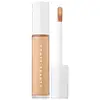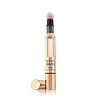Fenty Beauty Pro Filt'r Instant Retouch Concealer Versus Charlotte Tilbury Magic Away Liquid Concealer
What's inside
What's inside
 Key Ingredients
Key Ingredients

 Benefits
Benefits

 Concerns
Concerns

 Ingredients Side-by-side
Ingredients Side-by-side

Water
Skin ConditioningHydrogenated Didecene
Skin ConditioningHydrogenated Polyisobutene
EmollientDisteardimonium Hectorite
StabilisingTrimethylsiloxysilicate
EmollientCetyl PEG/PPG-10/1 Dimethicone
EmulsifyingGlycerin
HumectantNylon-12
Dimethicone
EmollientMethicone
EmollientSodium Chloride
MaskingAcrylates/Polytrimethylsiloxymethacrylate Copolymer
Skin ConditioningPolymethylsilsesquioxane
Hydrogenated Styrene/Isoprene Copolymer
Hydroxyacetophenone
AntioxidantLauryl PEG-8 Dimethicone
Hdi/Trimethylol Hexyllactone Crosspolymer
1,2-Hexanediol
Skin ConditioningCaprylyl Glycol
EmollientTocopheryl Acetate
AntioxidantTrisodium Ethylenediamine Disuccinate
Talc
AbrasiveLauroyl Lysine
Skin ConditioningCombretum Fruticosum Flower Nectar
MaskingAlcohol
AntimicrobialButylene Glycol
HumectantPentaerythrityl Tetra-Di-T-Butyl Hydroxyhydrocinnamate
AntioxidantCentella Asiatica Leaf Extract
Skin ConditioningCamellia Sinensis Leaf Extract
AntimicrobialCI 77891
Cosmetic ColorantIron Oxides
Water, Hydrogenated Didecene, Hydrogenated Polyisobutene, Disteardimonium Hectorite, Trimethylsiloxysilicate, Cetyl PEG/PPG-10/1 Dimethicone, Glycerin, Nylon-12, Dimethicone, Methicone, Sodium Chloride, Acrylates/Polytrimethylsiloxymethacrylate Copolymer, Polymethylsilsesquioxane, Hydrogenated Styrene/Isoprene Copolymer, Hydroxyacetophenone, Lauryl PEG-8 Dimethicone, Hdi/Trimethylol Hexyllactone Crosspolymer, 1,2-Hexanediol, Caprylyl Glycol, Tocopheryl Acetate, Trisodium Ethylenediamine Disuccinate, Talc, Lauroyl Lysine, Combretum Fruticosum Flower Nectar, Alcohol, Butylene Glycol, Pentaerythrityl Tetra-Di-T-Butyl Hydroxyhydrocinnamate, Centella Asiatica Leaf Extract, Camellia Sinensis Leaf Extract, CI 77891, Iron Oxides
Water
Skin ConditioningHydrogenated Polyisobutene
EmollientHydrogenated Didecene
Skin ConditioningGlycerin
HumectantTrimethylsiloxysilicate
EmollientCetyl PEG/PPG-10/1 Dimethicone
EmulsifyingPalmitoyl Glycine
CleansingAlbizia Julibrissin Bark Extract
MaskingMethicone
EmollientSodium Chloride
MaskingPolymethylsilsesquioxane
Disteardimonium Hectorite
StabilisingHydroxyacetophenone
AntioxidantLauryl PEG-8 Dimethicone
Hydrogenated Styrene/Isoprene Copolymer
Hdi/Trimethylol Hexyllactone Crosspolymer
Propanediol
Solvent1,2-Hexanediol
Skin ConditioningCaprylyl Glycol
EmollientTocopheryl Acetate
AntioxidantTrisodium Ethylenediamine Disuccinate
Tephrosia Purpurea Seed Extract
Skin ConditioningLauroyl Lysine
Skin ConditioningTalc
AbrasiveDarutoside
Skin ConditioningPentaerythrityl Tetra-Di-T-Butyl Hydroxyhydrocinnamate
AntioxidantCI 77891
Cosmetic ColorantIron Oxides
Water, Hydrogenated Polyisobutene, Hydrogenated Didecene, Glycerin, Trimethylsiloxysilicate, Cetyl PEG/PPG-10/1 Dimethicone, Palmitoyl Glycine, Albizia Julibrissin Bark Extract, Methicone, Sodium Chloride, Polymethylsilsesquioxane, Disteardimonium Hectorite, Hydroxyacetophenone, Lauryl PEG-8 Dimethicone, Hydrogenated Styrene/Isoprene Copolymer, Hdi/Trimethylol Hexyllactone Crosspolymer, Propanediol, 1,2-Hexanediol, Caprylyl Glycol, Tocopheryl Acetate, Trisodium Ethylenediamine Disuccinate, Tephrosia Purpurea Seed Extract, Lauroyl Lysine, Talc, Darutoside, Pentaerythrityl Tetra-Di-T-Butyl Hydroxyhydrocinnamate, CI 77891, Iron Oxides
 Reviews
Reviews

Ingredients Explained
These ingredients are found in both products.
Ingredients higher up in an ingredient list are typically present in a larger amount.
1,2-Hexanediol is a synthetic liquid and another multi-functional powerhouse.
It is a:
- Humectant, drawing moisture into the skin
- Emollient, helping to soften skin
- Solvent, dispersing and stabilizing formulas
- Preservative booster, enhancing the antimicrobial activity of other preservatives
Caprylyl Glycol is a humectant and emollient, meaning it attracts and preserves moisture.
It is a common ingredient in many products, especially those designed to hydrate skin. The primary benefits are retaining moisture, skin softening, and promoting a healthy skin barrier.
Though Caprylyl Glycol is an alcohol derived from fatty acids, it is not the kind that can dry out skin.
This ingredient is also used as a preservative to extend the life of products. It has slight antimicrobial properties.
Learn more about Caprylyl GlycolThis ingredient is a high molecular weight silicone. It has emulsifying and skin conditioning properties.
Ci 77891 is a white pigment from Titanium dioxide. It is naturally found in minerals such as rutile and ilmenite.
It's main function is to add a white color to cosmetics. It can also be mixed with other colors to create different shades.
Ci 77891 is commonly found in sunscreens due to its ability to block UV rays.
Learn more about CI 77891Disteardimonium Hectorite comes from the clay mineral named hectorite. It is used to add thickness to a product.
It can also help stabilize a product by helping to disperse other ingredients.
Hectorite is a rare, white clay mineral.
Learn more about Disteardimonium HectoriteGlycerin is already naturally found in your skin. It helps moisturize and protect your skin.
A study from 2016 found glycerin to be more effective as a humectant than AHAs and hyaluronic acid.
As a humectant, it helps the skin stay hydrated by pulling moisture to your skin. The low molecular weight of glycerin allows it to pull moisture into the deeper layers of your skin.
Hydrated skin improves your skin barrier; Your skin barrier helps protect against irritants and bacteria.
Glycerin has also been found to have antimicrobial and antiviral properties. Due to these properties, glycerin is often used in wound and burn treatments.
In cosmetics, glycerin is usually derived from plants such as soybean or palm. However, it can also be sourced from animals, such as tallow or animal fat.
This ingredient is organic, colorless, odorless, and non-toxic.
Glycerin is the name for this ingredient in American English. British English uses Glycerol/Glycerine.
Learn more about GlycerinThis ingredient is a powder used to improve texture, slip, and give products a silky texture.
We don't have a description for Hydrogenated Didecene yet.
Hydrogenated Polyisobutene is a synthetic polymer. Polymers are compounds with high molecular weight. Hydrogenated Polyisobutene is an emollient and texture enhancer.
In one study, Hydrogenated Polyisobutene showed better skin hydration levels than Caprylic/Capric Triglyceride. As an emollient, it helps keep your skin soft and hydrated by trapping moisture in.
Hydrogenated Polyisobutene is often used as a mineral oil replacement.
Learn more about Hydrogenated PolyisobuteneWe don't have a description for Hydrogenated Styrene/Isoprene Copolymer yet.
Hydroxyacetophenone is antioxidant with skin conditioning and soothing properties. It also boosts the efficiency of preservatives.
This ingredient is not irritating or sensitizing.
This ingredient comes from a fatty acid (lauric acid) and amino acid (lysine). It is used to add a silky feel to cosmetics.
According to a manufacturer, its fatty acid base leaves a silky feeling on the skin. It also has emollient properties because of this. Emollients help soften skin by preventing water from evaporating.
Lauroyl lysine is barely soluble in water.
Learn more about Lauroyl LysineLauryl PEG-8 Dimethicone is a type of silicone.
Methicone is a type of silicone and is a simpler form of dimethicone.
Silicones are used to enhance the texture of products and have emollient properties. Methicone is used to give products a silky texture and improves spreadability.
Pentaerythrityl Tetra-Di-T-Butyl Hydroxyhydrocinnamate (long name, huh?) is a synthetic antioxidant.
It is used to help stabilize other antioxidants or prevent the color from changing in a product.
As an antioxidant, it helps fight free-radical molecules. Free-radical molecules are capable of damaging our cells and other genetic material. Thus, antioxidants may reduce the signs of aging.
This ingredient is oil-soluble.
Learn more about Pentaerythrityl Tetra-Di-T-Butyl HydroxyhydrocinnamatePolymethylsilsesquioxane is a silicone used as a film forming agent.
When applied to the skin, this ingredient creates an invisible film on the surface. This film still allows oxygen to pass through, but prevents moisture from escaping. This can help condition and hydrate the skin. It also leaves a silky feel when applied.
Polymethylsilsesquioxane has not been shown to clog pores. It has been deemed safe to use up to 55%, but most cosmetics use much less.
If you have concerns about using this ingredient, we recommend speaking with a professional.
Learn more about PolymethylsilsesquioxaneChances are, you eat sodium chloride every day. Sodium Chloride is also known as table salt.
This ingredient has many purposes in skincare: thickener, emulsifier, and exfoliator.
You'll most likely find this ingredient in cleansers where it is used to create a gel-like texture. As an emulsifier, it also prevents ingredients from separating.
There is much debate on whether this ingredient is comedogenic. The short answer - comedogenic ratings don't tell the whole story. Learn more about comegodenic ratings here.
The concensus about this ingredient causing acne seems to be divided. Research is needed to understand if this ingredient does cause acne.
Scrubs may use salt as the primary exfoliating ingredient.
Learn more about Sodium ChlorideTalc is a clay mineral. It helps absorb moisture and improve the texture of products. Like other types of clay, Talc can have a slight exfoliating effect on skin. Talc can be added to increase the volume of products.
Some Baby powders are made by combining talc with corn starch. The word "talc" comes from Latin and originates from Arabic. Talc is a mineral commonly found throughout the world.
If you have any concerns about using talc, we recommend checking out the FDA's official page.
Learn more about TalcTocopheryl Acetate is AKA Vitamin E. It is an antioxidant and protects your skin from free radicals. Free radicals damage the skin by breaking down collagen.
One study found using Tocopheryl Acetate with Vitamin C decreased the number of sunburned cells.
Tocopheryl Acetate is commonly found in both skincare and dietary supplements.
Learn more about Tocopheryl AcetateThis silicone is an emollient. Emollients create a thin film on the skin to prevent moisture from escaping.
It is not soluble in water and helps increase water-resistance in products.
According to a manufacturer, it can blend seamlessly with silicone oils, such as Cyclopentasiloxane.
Learn more about TrimethylsiloxysilicateTrisodium Ethylenediamine Disuccinate is used to help stabilize a product.
It is a chelating agent, meaning it helps prevent metal ions from binding to other ingredients. This prevents unwanted reactions in products. Metal ions can come into a product via the water ingredient. They are found in trace amounts and are not known to be harmful.
Water. It's the most common cosmetic ingredient of all. You'll usually see it at the top of ingredient lists, meaning that it makes up the largest part of the product.
So why is it so popular? Water most often acts as a solvent - this means that it helps dissolve other ingredients into the formulation.
You'll also recognize water as that liquid we all need to stay alive. If you see this, drink a glass of water. Stay hydrated!
Learn more about WaterThis ingredient is a combination of red, black, and yellow iron oxide pigments. This combination of colors is usually found in foundation, because it results in a "skin" color.